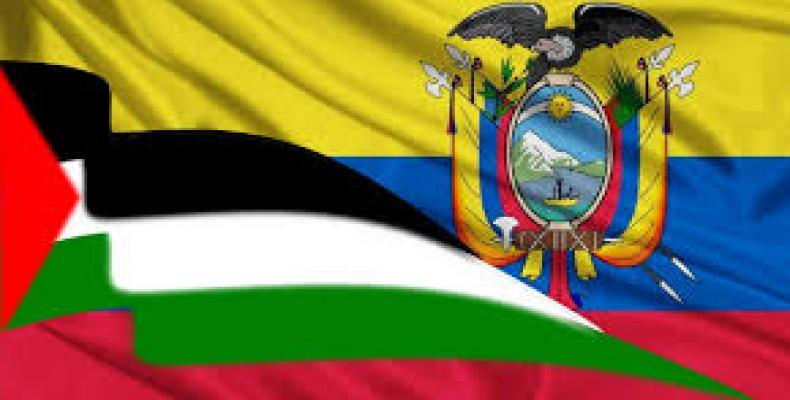Quito, August 24 (RHC)-- Pro-Palestine organizers and activists in Ecuador's capital, Quito, converged on the nation's second-largest bank, Banco del Pacifico, calling on it to end its contract with the British-based security company G4S.
The action, organized by Ecuador For Palestine -- a coalition of social organizations and individuals -- is the latest move in an international campaign calling for boycotts, divestments, and sanctions, or BDS, against the Israeli occupation of Palestine.
Participants in the protest, attended by approximately 40 people, held a symbolic “die-in” at the company's headquarters in Quito's central business district while leafleting local residents about the human rights abuses carried out by the Israeli occupation.
Protesters held a symbolic "die-in" to bring attention to the human rights abuses of G4S. According to Ecuador For Palestine's website, G4S is present in 21 cities in Ecuador and employs about 6,000 people -- making it the largest private security firm in the South American country.
While the Ecuadorean Palestine solidarity campaigners are critical of the state-owned bank, they have maintained dialogue with ministers and officials in the country's ruling party, PAIS, to better leverage Ecuador's geopolitical relationships.
As the world's largest security and prison services provider, G4S mercenaries have gained notoriety among human-rights advocates. The security company has been a stakeholder in the occupation of Palestine, running Israeli military checkpoints and terminals while providing services and material to Israeli prisons and interrogation centers. In total, G4S employs about 8,000 people within Israel.
Meanwhile, in the United States, the security corporation has contracted with the U.S. Department of Homeland Security Immigration and Customs Enforcement, or DHS-ICE, to detain, lock up, and deport undocumented residents.
In Britain, G4S was among a group of detention contractors who were found to have exploited detainees as virtual slaves, forcing them to work for as little as little as 1 pound per hour to cook and clean in place of staff.
Pressured by a growing worldwide BDS movement, including protests at G4S's annual general meetings, many of the firm's clients -- including U.N. bodies, trade unions, universities, non-profit foundations and other private firms -- terminated their contracts with the company.
Last week, the city council of Berkeley, California, passed a resolution calling on the U.S. city to divest from private prison corporations including G4S, the Corrections Corporation of America, and GEO Group, according to the Electronifc Intifada.
Earlier this year, G4S stated its intention to sell its subsidiaries in Israel, yet the company has made similar pledges in the past that it failed to follow through on. G4S has denied that the sale of its Israeli division was in response to the intense international campaign waged against it, yet Palestine solidarity organizers have pointed to the announced withdrawal of the company from Israel as proof of the success of boycott campaign.
Eduardo Meneses, 32, is a Quito resident and pro-Palestine campaigner who spent 3 years living in Beit Sahour, a Palestinian community in the West Bank facing constant encroachment by illegal Israeli settlements. Meneses explained the importance of BDS to teleSUR: “When I was in Palestine, I saw that the people needed international solidarity in the fight against military and cultural occupation. Israel receives international help from the U.S. government, the European Union, and countries all over the world—so only international solidarity is capable of ending the occupation.”


